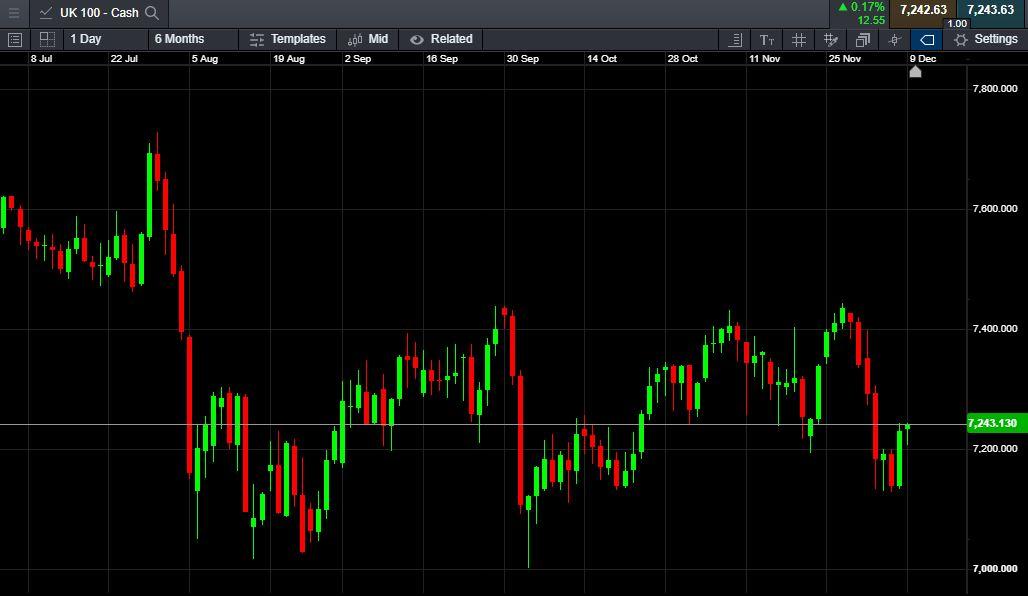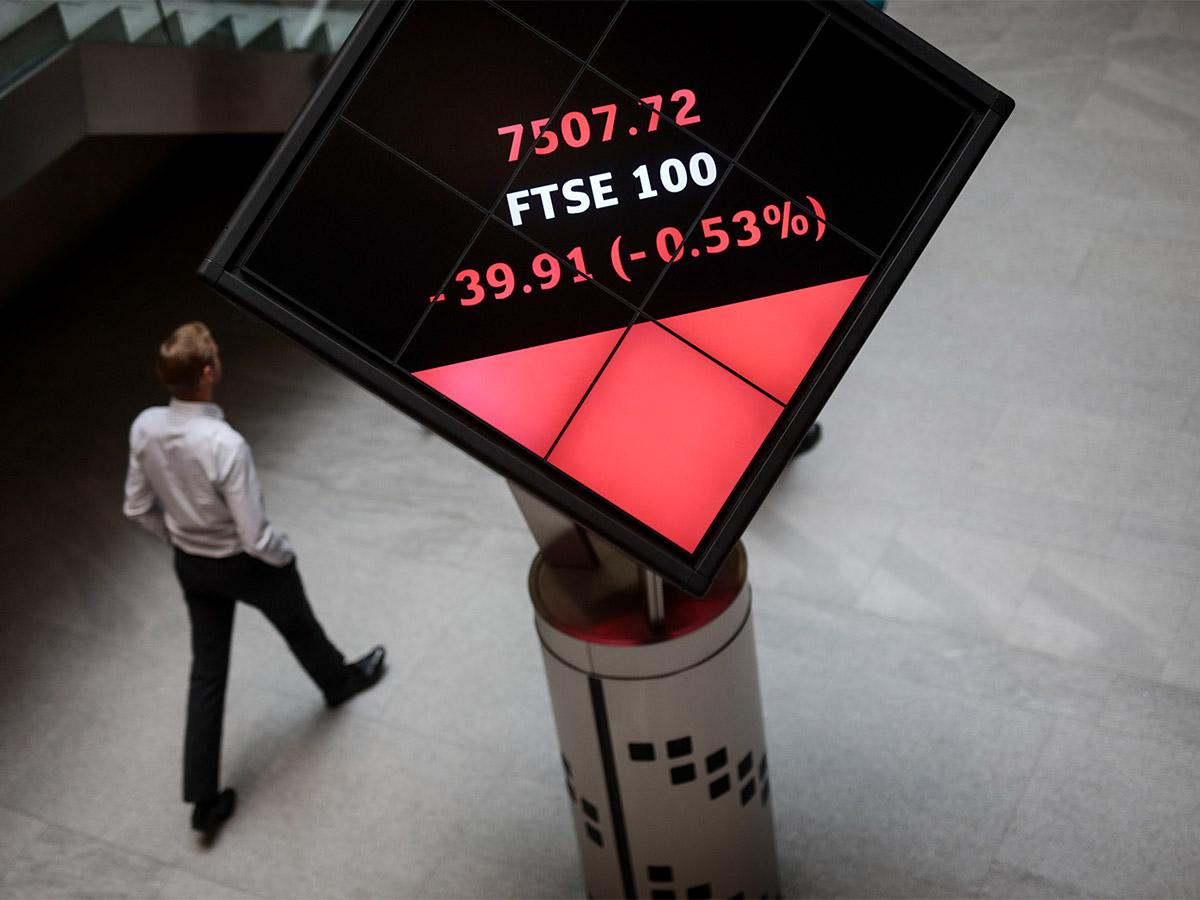Last week, the FTSE 100 index sank to its lowest level since early October, falling 0.7% on Thursday (5 December) to 7,137 points. While London’s blue-chip index did rebound in November, since Parliament was dissolved on November 6 it has fallen 2.1% (as of 6 December).
In contrast, sterling cruised to above €1.1851 against the euro last Thursday, its best performance in 31 months, and opened at $1.3158 against the dollar the following day – its best showing versus the Dollar in seven months.

The main catalysts for the diverse performances were a raft of polls and surveys suggesting that the Conservative party was on course to gain a parliamentary majority at the general election this Thursday.
Such a result, some traders and analysts believe, would mean a clear path to Brexit given the new withdrawal deal secured by Prime Minister Boris Johnson with the EU before going to the polls. On the other hand, a hung Parliament or Labour majority could, some believe, prolong the political deadlock over Brexit and further dent UK business confidence and investments.
A Conservative majority could see the pound continuing to strengthen into the New Year, according to analyst Petr Krpata, chief FX strategist at ING, who forecasts a rise to €1.2050 against the euro. Against the dollar, sterling could climb to $1.35, according to Rupert Thompson, head of research at Kingswood.
What will a strong pound mean for the FTSE 100?
Further gains in the pound would mean strain for the FTSE 100, Laith Khalaf an equity analyst at Hargreaves Lansdown tells Proactive Investors, as companies on the index derive about 75% of their revenues from outside the UK, mainly in the US, China, Germany and France.
In short, this means that if sterling continues to strengthen then dollar revenues, for example, are worth less when converted back into sterling.
This is partly why the FTSE 250, which derives 50% of its revenues and earnings from the UK according to Hargreaves Lansdown, has had a better performance during the election period, climbing 3.5% between 6 November and 6 December.
“Sterling’s advances do not crimp FTSE 250 stocks earnings power quite so much and it may help in some cases, by reducing imported raw material costs and keeping a lid on inflation, to the benefit of consumers’ real-terms spending power,” Russ Mould, investment director at AJ Bell, wrote in a note to clients on 5 December.
“Companies that rely more heavily on the UK than overseas markets for their business may also be drawing encouragement from how all of the major parties are promising to spend more in an attempt to stoke economic growth, in an apparent end to the era of austerity," Mould notes.
“Companies that rely more heavily on the UK than overseas markets for their business may also be drawing encouragement from how all of the major parties are promising to spend more in an attempt to stoke economic growth, in an apparent end to the era of austerity” - investment director at AJ Bell, Russ Mould
He added that there is an absence of panic in the share prices of FTSE 100 companies about the effects of Labour’s nationalisation promises, even those such as utilities that are likely to be affected the most.
Are domestically focused stocks set to gain further?
Mould says UK companies such as house builder Persimmon [PSN], energy group Centrica [CNA], broadcaster ITV [ITV] and high street bank Lloyds [LLOY] all rank among the FTSE 100’s ten best performers since the race to 10 Downing Street began. By contrast, Compass [CPG] and Johnson Matthey [JMAT] are lagging, as are dollar earners like BP [BP].
If the pound does continue to climb in the event the Conservatives win a majority then domestically focused stocks on the FTSE 250, such as retailer Marks & Spencer [MKS], will benefit from rising consumer spending and increased investor confidence.
This should boost stocks across sectors such as retail, housebuilding, financials and airlines, according to global head of FX strategy at Swiss bank Union Bancaire Privée [UBP] Peter Kinsella.
But these stocks, Mould adds, shouldn’t get too comfortable. There is no guarantee that even a Tory majority will mean a smooth Brexit transition or economic boost. “Markets may start focusing on the next Brexit deadline pretty quickly, especially if any early talks with Brussels yield more deadlock,” he says.
“Markets may start focusing on the next Brexit deadline pretty quickly, especially if any early talks with Brussels yield more deadlock” - investment director at AJ Bell, Russ Mould
Thompson is equally cautious.
“At best, the UK/EU will probably only be able to agree a very limited kind of trade deal within a year particularly given Conservative plans for regulatory divergence from the EU,” he tells Property Investor.
Other trade deals should also take several years to put in place. Consequently, while we expect UK growth to recover a bit as Brexit uncertainty eases and the boost from higher government spending kicks in, we still expect it to remain sluggish next year at 1.25-1.5%.”
Traders and voters alike need to proceed with caution in the days ahead, as a surge in sterling after the UK election could be short-lived if Brexit gets even more complicated.
“At best, the UK/EU will probably only be able to agree a very limited kind of trade deal within a year particularly given Conservative plans for regulatory divergence from the EU” - head of research at Kingswood, Rupert Thompson
Continue reading for FREE
- Includes free newsletter updates, unsubscribe anytime. Privacy policy





